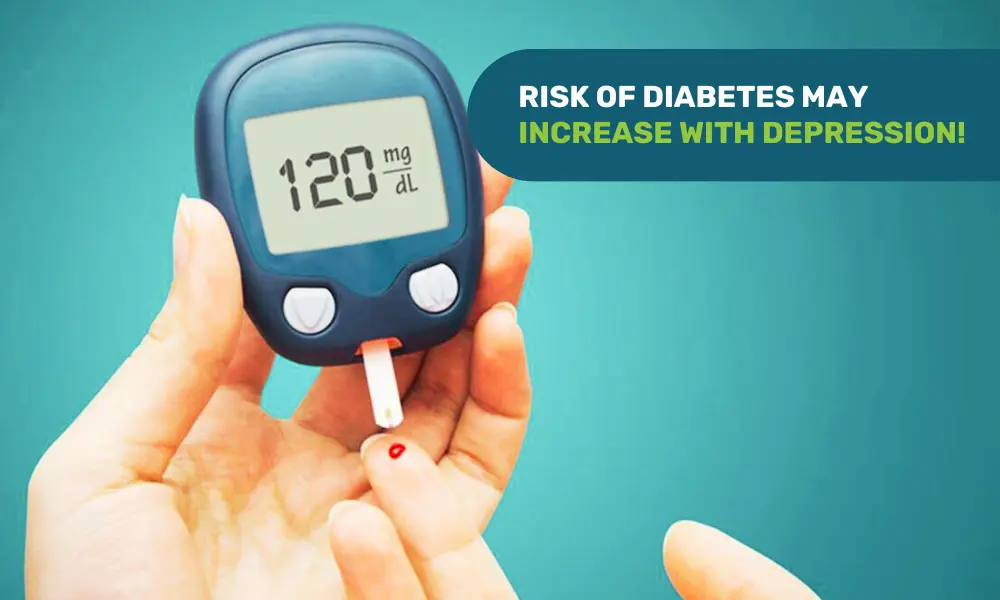Diabetes is becoming one of the most common health conditions affecting millions globally. Many factors, including obesity, lack of physical activity, and family history, may increase the risk of diabetes for individuals. However, as per a recent study, depression may be a direct cause of type 2 diabetes*. Depression and type 2 diabetes can influence each other and increase the risk of other health complications.
Relationship between depression and type 2 diabetes
Depression affects various aspects of a person’s life that may increase the risk of diabetes. Chronic stress and depression lead to unhealthy behaviours like lack of physical inactivity, overeating, and poor sleep, which can substantially contribute to insulin resistance and obesity, both of which are major risk factors for type 2 diabetes.
Additionally, depression impacts our body’s stress response system and leads to dysregulation of hormones responsible for glucose metabolism, such as insulin, cortisol, and glucagon. This dysregulation of hormones contributes to the development of insulin resistance.
Indicative Factors of type 2 diabetes in individuals with depression
Certain factors in individuals with depression may indicate a risk of developing diabetes. These may include:
-
A person with a family history of type 2 diabetes or a history of depression is at a higher risk of developing diabetes.
-
Lack of physical activity levels, diet habits, and substance abuse can increase the risk of diabetes.
-
Obesity or other metabolic abnormalities can indicate diabetes risk.
-
Tests like Fasting blood glucose levels and HbA1c over the past few months can also indicate if a person has diabetes or is at risk of developing it.
Other risk factors that may increase the chances of developing type 2 diabetes:
-
Obesity or excess body weight
-
High blood pressure
-
Family history of diabetes
-
Sedentary lifestyle
-
Poor diet that is high in sugar and unhealthy fats
-
Age (risk increases with age)
Ways to manage depression
Managing depression to reduce the risk of developing diabetes involves a multi-faceted approach, such as:
-
Practice a healthy lifestyle: One must focus on regular exercise, weight management, and a balanced diet to improve insulin sensitivity and overall health. Alcohol and certain substances worsen symptoms of depression and increase the risk of developing diabetes, so it’s best to avoid these substances.
-
Stress management: One must practice relaxation techniques such as yoga, mindfulness, or meditation to reduce stress levels. One must indulge in activities that can help cope with stress.
-
Seek professional help: One must also consult with a mental health expert or therapist to get help in managing depression. This may include cognitive-behavioral therapy (CBT) if necessary.
-
Build a support system: One must seek support from family, friends, or support groups. Sharing our feelings and experiences with others who understand can help alleviate symptoms of depression.
-
Sleeping Pattern: One must prioritize a regular sleep schedule and aim for 7 to 9 hours of quality sleep every night. Poor sleep can worsen symptoms of depression and increase the risk of developing diabetes.
-
Medication, if needed: In some cases, medication may be necessary to treat depression, and it is essential to follow a healthcare provider’s guidance. If an individual is taking medication for depression, it is important to take it as prescribed and regular follow-up appointments with your healthcare provider.
-
Regular monitoring: If an individual is at risk of developing diabetes, one must maintain regular check-ups and consult a doctor to monitor your blood sugar levels and overall health.
In a nutshell
Remember that a collaborative approach involving mental health professionals, primary care physicians, and lifestyle modifications is crucial to manage both depression and reduce the risk of type 2 diabetes effectively. However, keeping a check on blood sugar level is also essential for those who have diabetes.
Data Source: https://shorturl.at/uBKV7





